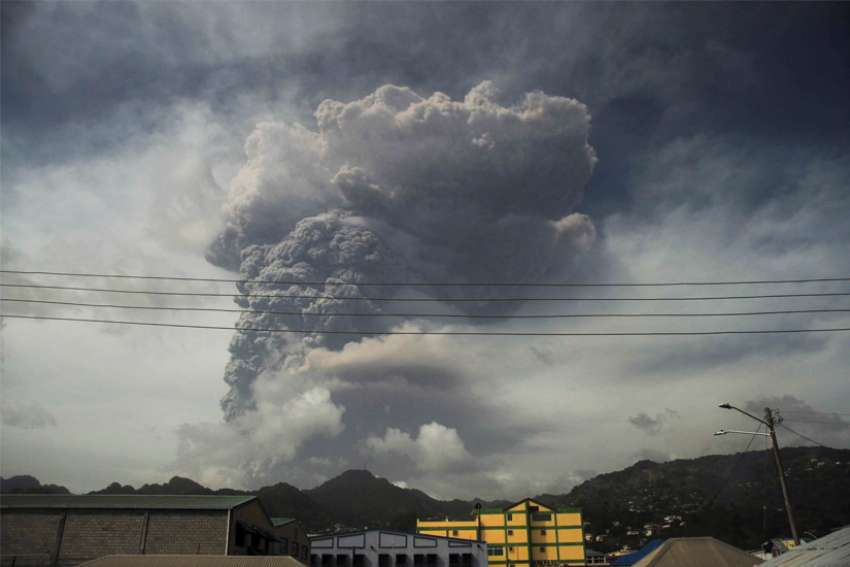With facial covering ubiquitous on the island for over a year due to COVID-19, these days they also provide protection against the volcanic ash filling the air since the eruption of La Soufriere volcano on April 9.
Inhalation of volcanic ash can be very detrimental to human health, with its harmful aerosols and poisonous gases. Although the Caribbean is accustomed to hurricanes, the potential health and economic impact of the eruptions on the nation already adversely impacted by COVID-19 remains to be seen.
“A hurricane will hit today but within hours it goes and you just have to worry about the aftermath, the cleanup and all that,” said Belgraves, a deacon at St. Theresa Church in the island’s south end. “But this one has so much uncertainty. You never know how much stuff is in that volcano to be spewed out.”
The couple keep their doors and windows closed to prevent the tiny particles from coming in, but there’s nothing they can do to keep it from accumulating in the yard.
“Every 12 hours or so the volcano erupts, and the ash is so heavy that when you clean one time, you have to clean again because the whole thing piles up,” said Belgraves. “It’s a lot of work around the yard, and I have a big yard. I’m living near the road which gets cluttered, and as the vehicles pass (the ash) goes right into my yard. It’s a rough situation.”
Belgraves is fortunate to be outside of the red zone of the volcano at the northern end of the eastern Caribbean island of roughly 110,000 people. Due to the increased seismic activity of the volcano — it’s predicted eruptions could continue for months — 20,000 people living in the red zones were evacuated and are now living in shelters in the south.
Belgraves and parishioners at St. Theresa, through their own means, have been preparing Sunday dinners for people living in shelters in the nearby area. The Caribbean community at large has rallied in support of the nation in its time of need, with neighbouring islands donating water and supplies and offering human resources to help in the relief effort.
Those efforts have spread to nations farther away. Caribbean communities in Toronto have been collecting donations and offering funds in support of displaced families.
Fr. Carlyle Giuseppe at Our Lady of Good Counsel, a Caribbean-Canadian Catholic parish in downtown Toronto, says though the congregation is of limited means, people are doing everything they can to support those on the island.
“When anything hits the Caribbean, we’re all in it in together, we suffer together,” said Giuseppe. “It’s reassuring to note that a lot of the Caribbean islands are also trying to get together to help them. Even other Caribbean consuls here in Canada are getting people together to help, to raise funds to send to St. Vincent. We have to kind of come around each other and help each other.”
The church has been keeping the island in prayer continually and will be collecting funds in the coming weeks in support of the relief effort. They urge anyone who is able to help out to visit the Archdiocese of Toronto website and specify where they would like to direct any funds.
Fitzgerald Huggins, the Canadian consul general of St. Vincent and the Grenadines in Toronto, has been working with various charities in the city and is overseeing shipments of items and financial donations being collected and shipped to the National Emergency Management Organisation (NEMO). The island will be in the situation for a while and will need to rely on the international community for assistance over the coming months, Huggins said.
Back on the island, with space at shelters in most cases not adequate for social distancing and many people still not vaccinated, COVID-19 outbreaks at the shelters have been a major issue. Fr. Kevin Murray of St. Benedict’s Parish in Georgetown, part of the red zone, was relocated to the south and has been travelling daily to Catholic schools and churches turned into emergency shelters to deliver food and supplies.
He sees the conditions at the shelters where cots are limited and many are sleeping on the floor. The third disaster in the nation over a short period of time, the volcano is further compounding challenges from the COVID-19 pandemic and a dengue fever outbreak declared in October 2020. With no deaths from the volcano reported, he says people are grateful to be alive and despite the long road ahead are doing their best to remain in good spirits.
“A lot of people are relying on their faith,” said Murray. “The culture is resilient. People have been through a lot and have the ability to bounce back.”


